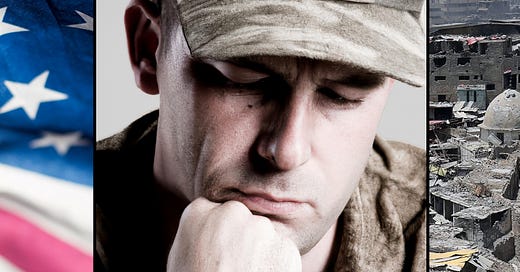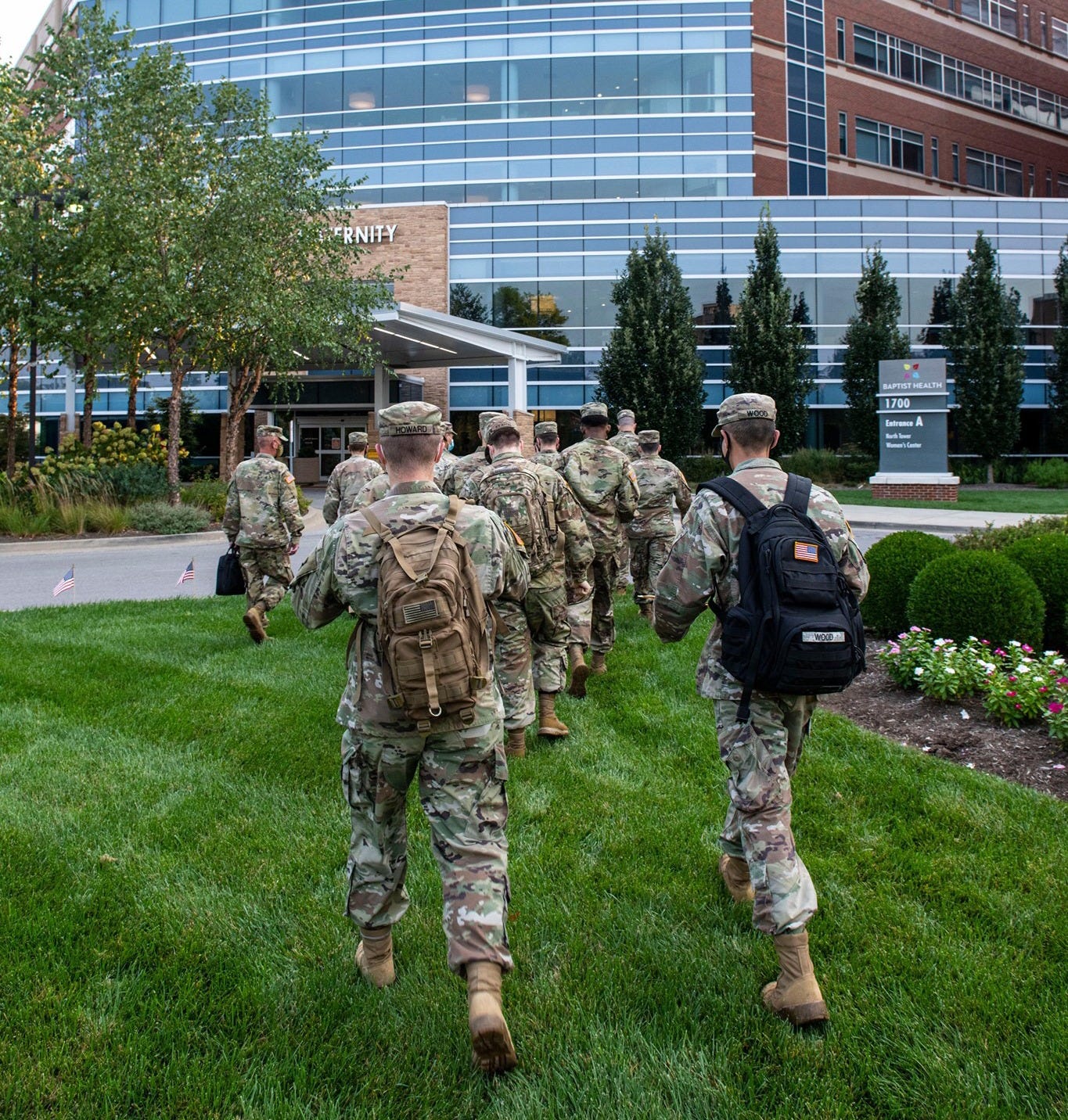The Moral Tensions of Joining the Military
Soldiers wrestle with the ethics of how their service is put to use. You should too.
This post is by Contributor Timothy Wood. The views expressed do not represent any official position of any government agency.
We need to reevaluate the relationship between society and the armed forces. The military is a tool, but tools can be misused. I come from a long line of soldiers. I’ve been steeped in the military since the day I was born. There’s a tension every soldier wrestles with on one level or another. How do we reconcile our decision to become part of this tool knowing that it will sometimes be wielded in ways we may disagree with? But this tension is a two-way street. If we want to get to the core of the ethics involved, we must all look in the mirror. There’s more than a million people in uniform, and we come from a million backgrounds. Some join because they needed to, and some because they wanted to. We may choose to join, but we don’t pick the mission. For that we depend on you, and the hope that you won’t wax disinterested or distracted, just because the stories are far away and uncomfortable. The ethics of war and foreign policy fall on soldiers and civilians alike.
Some soldiers, of course, were never given a choice. My uncle didn’t “join” the Army. It was Vietnam. “Joining” the Army was like saying you wanted a tax audit because you didn’t burn your W-2 form. He was badly injured and spent the rest of his life wearing a brace and an adult diaper. He still did some pretty amazing things. He taught me how to play X-Men on Sega Genesis. At least as important, he won Michigan Teacher of the Year for working with troubled youth in inner-city Detroit. That’s not a link on Indeed that has a lot of clicks.
My dad had a choice — but a very constrained one. He was a kid from the hollar. For those not from Appalachia, a hollar is a small rural road that runs between difficult terrain to reach the scarce oases of buildable or arable land. The Army was one of the only ways out. He’s also a disabled veteran. What he definitely volunteered for was going to Iraq in 2004 despite being able to retire. He purposefully stayed because he didn’t want the kids he’d trained to go to war without him. Most of them came home, but not all.
For my part, I joined the National Guard because I wanted to help people. Check out the news. Wildfires? Floods? Tornados? A once-in-a-century pandemic? Yeah. I’m in this picture, going to work in a hospital sorting samples from things like COVID swabs, because nobody was prepared for a huge increase in medical tests. It was pretty gross. I held stool samples that looked like blood samples, and lung samples that looked like stool samples. This arrangement is so ubiquitous you probably don’t notice that every time a governor gives a press conference in a disaster, there’s somebody standing behind them in uniform. That person is almost certainly part of the state’s national guard.
But the armed forces are, of course, also used in more overtly martial ways. To any member who is not a dyed in the wool neoconservative or a superfan of military interventionism, nation-building, and regime change, our service is not without ethical thorns. We are absolutely drilled in ethics, though. We are taught to disobey unlawful orders. I have looked people of higher rank in the eye, told them no, and asked them to please let me know when the court martial is scheduled. So far, nobody’s taken me up on the offer. We have far from a perfect track record as an institution. You may have heard about the My Lai Massacre, but there are things you probably haven’t heard of, like the No Gun Ri Massacre. We’ve put a lot of effort into acknowledging when things went horrifically wrong and taking steps to make sure they aren’t repeated.
One of the worst aspects about the aftermath of My Lai was that those who stopped it were denounced as traitors. This included members of Congress — the people who are in a position to send Americans to war, and who, at least sometimes, have done so based on and maintained through outright lies. By the time we made peace with those risking friendly fire to save strangers, one was dead and another threw his medal away. Atrocities and war crimes are inexcusable, but the United States isn’t, contrary to what isolationist conspiracy theorists would have you believe, a military dictatorship. The public either votes for the folks who make these decisions or allows them to be elected by abstention. We all have a stake in this.
One of the founding principles of the US military is that we serve at the behest of the people. There is an important reason why the head of the Defense Department and the Commander-in-Chief are civilians. From Julius Caesar to the several coups that have taken place in Africa recently, it doesn’t bode well when military leaders are the most powerful people in your country. But this means that in a democracy, “You The People” are ultimately who decides the mission and the fight, and that very much includes a decision made through passive indifference. As President John F. Kennedy noted, “In your hands, my fellow citizens, more than mine, will rest the final success or failure of our course.”
I’m not immune from this either. I was young when the US invaded Iraq and Afghanistan. I didn’t realize that high school classmates were going to come home in a box. We’d gone through the Gulf War when I was a kid. It went pretty well, all things considered. So did our intervention in Bosnia and Herzegovina in the ‘90s. We let a feeling of invincibility, hubris, and exceptionalism creep in, especially for a generation that didn’t live through Korea or Vietnam. We lost some 7,000 lives in our most recent wars. 7,000 stories ended. We saw hundreds of thousands wounded. In the aftermath, we lost four times as many to suicide as to combat. That’s not even counting those who came back silently broken, or the more than 300,000 Iraqi civilians and 70,000 Afghan and Pakistani civilians slain.
No organization as diverse as the US military can be described by any single story. Every service member is a story. I was once in a briefing where we were asked why we wore the uniform. The officer was clearly fishing for “freedom, liberty, and justice for all.” What they got was nuance. “I need to pay for college.” “My kiddo is sick and needs insurance.” “This is the only family I’ve ever had.” Some absolutely join because they want to kill bad people and they’re good at it. There is a place for that breed. But the way our service is put to use is something that weighs on us. We end up with a conflict of interest between the uniform and our boss, which is ultimately you.
Most of us aren’t SOCOM operators, bomber pilots, or artillery gunners. We are people doing a job. My uncle delivered mail, putting letters in hands that were far from home. My dad drove a truck, making sure supplies got where they were needed. I'm in finance and human resources. For every Mat Best doing a Sparta kick, there’s 50 others making sure they’re clothed, fed, paid, armed, and have good intelligence. Bastogne doesn’t work out so well if someone like Jimmy Fallon doesn’t show up to give the Band of Brothers some bullets.
The US isn’t one of the 49 countries that have mandatory military service; where in times of war or disaster, everyone’s in line for duty. Here, I’m in line, and you probably aren’t. It takes a special kind of person to leave their family and go do things that are dangerous and hard, especially an older generation who may have served against their will. They deserve our thanks, and most importantly, our support — by which I don’t mean a bumper sticker, but actual support.
Working at that hospital above, I was thanked for my service 10 or 20 times a day. For many that’s genuine gratitude. Sometimes for others, especially in positions of wealth and power, there is a subtext of “Thanks for doing this shit so me and my family don’t have to.” Robert Kennedy was once booed when he addressed the exemption of college students from the draft, but the reason there was such a public outcry over Vietnam was because from 1940 to 1973, having a war meant your ass might go too. That’s not the case anymore, mainly because the Reserves and the National Guard are intended to prevent the need for a draft. But we are a finite resource.
In Operation Lone Star, Texas Governor Gregg Abbot sent some 10,000 National Guard to police the border with Mexico. Many are still there. The entire affair has been a widely publicized clusterfuck. The ACLU sued Texas, alleging that the operation resulted in at least 31 deaths and 70 injuries. Multiple service members have died, including multiple suicides. It’s been a logistical nightmare in everything from housing to pay. Here’s a thought: maybe you shouldn’t be rescuing people from a river without fucking flotation devices! The Army Times aptly characterized the situation as “little training, virtually no equipment.” Pamela Anderson and David Hasselhoff didn’t run into the waves with that big red thingy on Baywatch just because it looked cool. It’s a flotation device, the kind that Specialist Evans probably would have benefited from when he drowned at age 22 trying to pull people from the Rio Grande.
Even the sharpest blade dulls and the hardest hammer cracks. The ethical struggles on our side are real — and they’re dependent on the ethical decisions from yours. Specialist Evans chose the water at great personal risk. He didn’t pick the mission. If you ever need him to pull you from your home after a flood or fire, sorry. He washed down river trying to save lives and accomplish the task he was given.
I’m quite sad that my daughter never got to meet my uncle. As a kid, I sat with him in the hospital in his dying days, and he taught me how to draw wood grain. My little girl would have loved him as I did, as I do. So when society swings the blade or the hammer, don’t count the cost in dollars; count it in stories. Those memories are going to be with us for a long time, especially when they don’t have happy endings. We may instinctively blame the North Vietnamese for what was done to my uncle, but his story is more complicated than that. For many soldiers — especially those who were drafted, or who joined because of economic hardship and lack of opportunity, or who joined young without understanding just how quickly they would drown — we, as a society, have much too long a history of pushing people in front of a bus and then blaming the bus. So how do we reconcile the choice to join with the mission we’re given? I don’t have any clear answer. It’s something we all have to work out together.
See also: “To Win the World, Innovation is Our Most Powerful Weapon”
Subscribe now and never miss a new post. You can also support the work on Patreon. Please consider sharing this article on your social networks, and hit the like button so more people can discover it. You can reach me at @AmericnDreaming on Twitter, or at AmericanDreaming08@Gmail.com.








Awesome article, Tim! As a libertarian, I constantly criticize politicians for some of the idiotic things they try to do using military troops. It's great to hear how it is from someone on the "business" end.
For some of us the impression that in too many we are, as Jimmy Carter famously says, an oligarchy - where our military serves capital accumulation and financial security often at the great expense of the powerless - precludes signing up to service pathological ends, despite the pressure from military veteran parents.